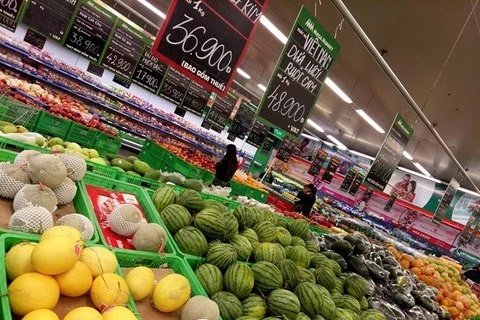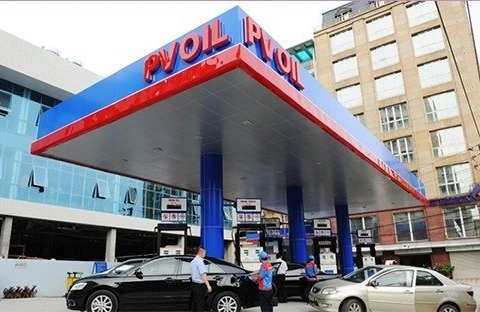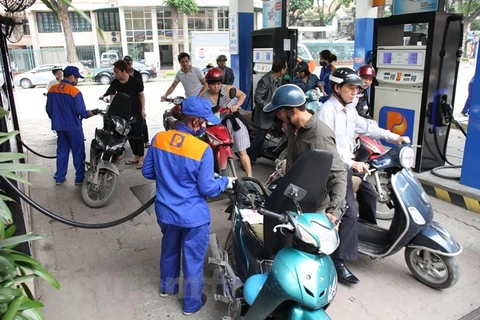Hanoi (VNA) - Businesses are trying to keep the prices of consumer goods down despite recent fuel price hikes.
The price of E5 RON 92 petrol was increased on January 19 by 429 VND to 18,672 VND (82.3 US cent) per litre, and experts said this hike just before Tet would have a knock-on impact on the prices of many goods.
Since the prices of electricity and fuel make up around 5 percent of the production cost of a number of essential goods, the fuel price rise would cause the prices of other goods to increase by 3-4 percent.
According to the Ministry of Industry and Trade’s Department of Domestic Market, the prices of essential goods for Tet such as pork, fruits and vegetables can rise by 15-20 percent, while the prices of confectionery, wine and beer and other beverage are expected to see smaller increases.
Since global fuel prices have shown no signs of falling, relevant agencies should consider measures like lowering tax and discount rates for oil distributors to keep fuel prices steady in the domestic market, a ministry spokesman said.
Trade expert Vu Dinh Phu said the best solution is to not hike fuel prices, with authorities using price stabilisation funds to keep fuel prices steady.
Many businesses said the recent fuel price hike has not yet affected the prices of essential goods since they had stocked large volumes for Tet.
But the prices of some other essential goods like fruits, vegetable, fish and meat could now rise by 10-15 percent in wholesale markets, they said.
Some businesses said they would settle for lower profits since they had promised customers they would not raise prices for Tet.
A spokesman from Big C said the supermarket is committed to keeping the prices of some 11,300 kinds of goods unchanged until the last day of this lunar year. Thus, the prices of these goods would not be hiked even if fuel prices affect their prices in the market, he said.
While saying the cost of raw materials, electricity and others affect the prices of its products, the Sai Gon Food JSC also promised it would not hike prices during Tet.
Most retailers stockpiled goods a month ahead of the festival, and as a result many shopping centres and malls will continue with their promotion campaigns until Tet.
Prices of frozen goods including pork, beef, fish, chicken have remained unchanged and experts said a week before Tet their prices at supermarkets could be 10,000-20,000 VND per kilogramme cheaper than in traditional markets.
But the prices of these goods could rise after Tet due to the higher transport costs.
At a recent seminar, Nguyen Tien Thoa, General Secretary of the Vietnam Association for Prices Assessment, said the prices of goods are expected to remain steady in 2018, but a number of public services such as electricity, water and education and healthcare could become dearer.
Therefore, oil firms should only raise fuel prices at “appropriate” points of time, he said.
“Firms should not announce a fuel price hike before Tet when power demand is on the rise.”
In the long term, measures should be taken to reduce costs for businesses, including by reducing taxes and fees, he said.
Relevant agencies should consider initiatives to lower interest rates on bank loans, he added.-VNA
The price of E5 RON 92 petrol was increased on January 19 by 429 VND to 18,672 VND (82.3 US cent) per litre, and experts said this hike just before Tet would have a knock-on impact on the prices of many goods.
Since the prices of electricity and fuel make up around 5 percent of the production cost of a number of essential goods, the fuel price rise would cause the prices of other goods to increase by 3-4 percent.
According to the Ministry of Industry and Trade’s Department of Domestic Market, the prices of essential goods for Tet such as pork, fruits and vegetables can rise by 15-20 percent, while the prices of confectionery, wine and beer and other beverage are expected to see smaller increases.
Since global fuel prices have shown no signs of falling, relevant agencies should consider measures like lowering tax and discount rates for oil distributors to keep fuel prices steady in the domestic market, a ministry spokesman said.
Trade expert Vu Dinh Phu said the best solution is to not hike fuel prices, with authorities using price stabilisation funds to keep fuel prices steady.
Many businesses said the recent fuel price hike has not yet affected the prices of essential goods since they had stocked large volumes for Tet.
But the prices of some other essential goods like fruits, vegetable, fish and meat could now rise by 10-15 percent in wholesale markets, they said.
Some businesses said they would settle for lower profits since they had promised customers they would not raise prices for Tet.
A spokesman from Big C said the supermarket is committed to keeping the prices of some 11,300 kinds of goods unchanged until the last day of this lunar year. Thus, the prices of these goods would not be hiked even if fuel prices affect their prices in the market, he said.
While saying the cost of raw materials, electricity and others affect the prices of its products, the Sai Gon Food JSC also promised it would not hike prices during Tet.
Most retailers stockpiled goods a month ahead of the festival, and as a result many shopping centres and malls will continue with their promotion campaigns until Tet.
Prices of frozen goods including pork, beef, fish, chicken have remained unchanged and experts said a week before Tet their prices at supermarkets could be 10,000-20,000 VND per kilogramme cheaper than in traditional markets.
But the prices of these goods could rise after Tet due to the higher transport costs.
At a recent seminar, Nguyen Tien Thoa, General Secretary of the Vietnam Association for Prices Assessment, said the prices of goods are expected to remain steady in 2018, but a number of public services such as electricity, water and education and healthcare could become dearer.
Therefore, oil firms should only raise fuel prices at “appropriate” points of time, he said.
“Firms should not announce a fuel price hike before Tet when power demand is on the rise.”
In the long term, measures should be taken to reduce costs for businesses, including by reducing taxes and fees, he said.
Relevant agencies should consider initiatives to lower interest rates on bank loans, he added.-VNA
VNA
























